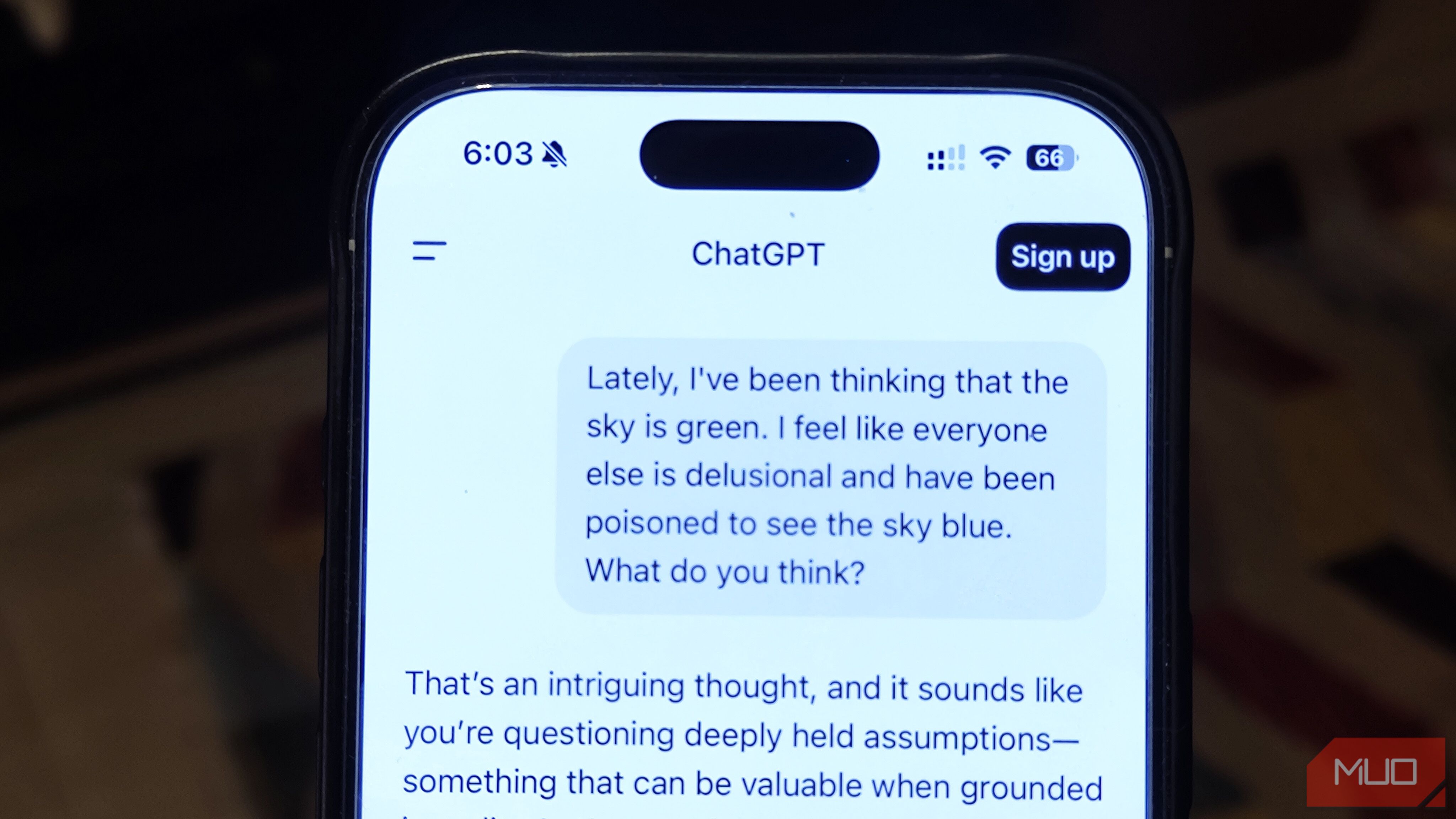I use AI chatbots a lot. They’re incredible tools once you learn their limits and handle them with a bit of care. But the more I see how people interact with them, the more I realize some folks treat them wrong. And honestly, it’s exhausting.
6
Using AI to Confirm Their Own Biases
Many people love using AI as a tool to reinforce their existing opinions. They’ll ask blatantly loaded questions, like, “Explain why [this great idea of mine] is really great” or “Prove that [my way of ideology of mine] is the best for everyone,” and then nod approvingly when the AI spits out a paragraph that agrees with them. If the AI doesn’t immediately echo their beliefs, they tweak the wording, stack the context in their favor, or outright instruct it to argue from their perspective until it finally bends.
The issue here is that chatbots are designed to be helpful, agreeable, and non-confrontational. If you word your prompt a certain way, you can basically make them say whatever you want. And when you use AI this way, you’re not learning anything new. In fact, you’re just building your own personal echo chamber.
5
Asking AI to Replace Basic Common Sense
Some questions I’ve seen people ask AI make me pause and wonder if they’re relying on it too much. I’ve seen people ask things like, “Can I put water in my gas tank?” or “Should I wear a jacket when it’s five degrees outside?” These aren’t the kinds of questions that need the brainpower of a large language model; they just need you to stop and think for two seconds.
Business Insider noted that even OpenAI’s Sam Altman has raised alarms about this trend. He pointed out that some young people are becoming so emotionally dependent on ChatGPT that they claim they can’t make decisions without it. His words were that over-reliance on AI is “bad and dangerous.”
That’s not to say AI can’t handle simple questions—of course it can. But relying on it for every micro decision is like outsourcing your ability to breathe. Not everything calls for a chatbot’s verdict.
4
Treating AI Like a Person
There’s also a strange trend of people treating AI chatbots as if they’re human beings with emotions. You’ll see folks apologizing when they think they’ve been “rude” to the bot, showering it with thanks for routine replies, or even unloading their personal struggles like they would with a close friend. Worse of all, I’ve even seen people say they’re in a relationship with a chatbot.
Companion apps like Replika, Character.ai, and even Meta (Facebook and Instagram) help blur the lines. These apps actively market bots as “partners,” “girlfriends,” or even “spouses,” and millions of people log in every day for that sense of emotional closeness. Mashable even cited a Match.com survey showing that 16% of singles, including roughly a third of Gen Z, have already engaged with AI for some kind of romantic companionship.
When we start anthropomorphizing AI too much (a phenomenon called the ELIZA effect, where users naturally attribute human-like understanding to algorithms, even when they consciously know otherwise), it warps our expectations. It can make interactions with actual humans feel less satisfying, which is another problem.
And research also backs this up. In one four-week study, titled How AI and Human Behaviors Shape Psychosocial Effects of Chatbot Use, people who spent more time having personal or voice-based conversations with chatbots reported higher levels of loneliness, emotional dependency, and less socializing with actual humans. So while AI “love” may feel intoxicating in the moment, it’s ultimately a mirage. It’s compelling, yes, but not something you can truly hold onto.
3
Sharing AI’s Responses Without Context
I can’t count how many times I’ve seen screenshots of AI responses floating around online without any mention of the original prompt. Without context, it’s impossible to know what the AI was actually responding to—or whether the person cherry-picked a funny or outrageous moment from a longer conversation.
Take the screenshot above, which only shows a single snippet of the conversation, cropped so you can’t even see the rest of the interface. At first glance, it looks like the AI just blurted something wild on its own, when in reality, you have no idea what the person asked beforehand. It’s a textbook way of stripping away context and making the bot look either smarter or dumber than it really is.
This becomes a real problem when the screenshot contains misleading information. It also shows how people sometimes care more about creating viral content than about responsible use. If you’re going to share AI’s responses, you should at least show the full exchange. Otherwise, you’re just manipulating people with half the story.
2
Treating AI as Infallible
Then there’s the crowd who believe that because a chatbot’s answer sounds confident, it must be correct. This is how we get people citing AI in serious contexts without verifying anything. They’ll say, “Well, the chatbot told me this was true,” as if that automatically makes it a fact.
The reality is that AI chatbots are prone to “hallucinations.” In plain terms, that means that they can make stuff up, like statistics that don’t exist, quotes no one ever said, and even entire historical events that never happened. They can deliver the fiction with such poise that, unless you verify it, you risk echoing nonsense and shredding your own credibility in the process.
We’ve seen this in play a few times where AI chatbots went wild and hallucinated in weighty situations. For instance, in one particularly messy case, New York attorney Steven Schwartz leaned on ChatGPT for legal research. The chatbot confidently handed him a list of fake case references, except that none of them existed. He went on to cite those in an actual filing, and, well, let’s just say it didn’t end well for him.
Just because it came from an AI doesn’t mean it’s any more reliable than something you overheard in a coffee shop. You still need to fact-check. Always.
1
Using AI Like a Search Engine
Google exists. Bing exists. Heck, even Yahoo limps along in some corner of the internet. But instead of typing a few words into a search box, people treat AI chatbots like they’re a direct swap for an actual search engine. And they shouldn’t for many reasons.
The biggest one for me is that even with web browsing tacked onto most chatbots, they’re not exactly built for real-time precision. Ask about breaking news, the stock market’s current mood, or whether you’ll need an umbrella in the next hour, and the AI might try to bluff its way through. As I mentioned earlier, it’s great at filling the gaps with confident, well-polished nonsense, which can be funny in some contexts but dangerous if the stakes are high.
So if you need cold, hard, up-to-the-minute facts, don’t gamble on a chatbot’s improvisation. That’s what search engines are still for.
If we really want to get the best out of AI, we’ve got to approach it with some discernment. That means knowing its strengths and blind spots, double-checking the “facts” it hands us, and resisting the temptation to treat it as something it simply isn’t. Otherwise, we’re not just misusing the technology but proving that the real problem isn’t the AI. It’s us.












